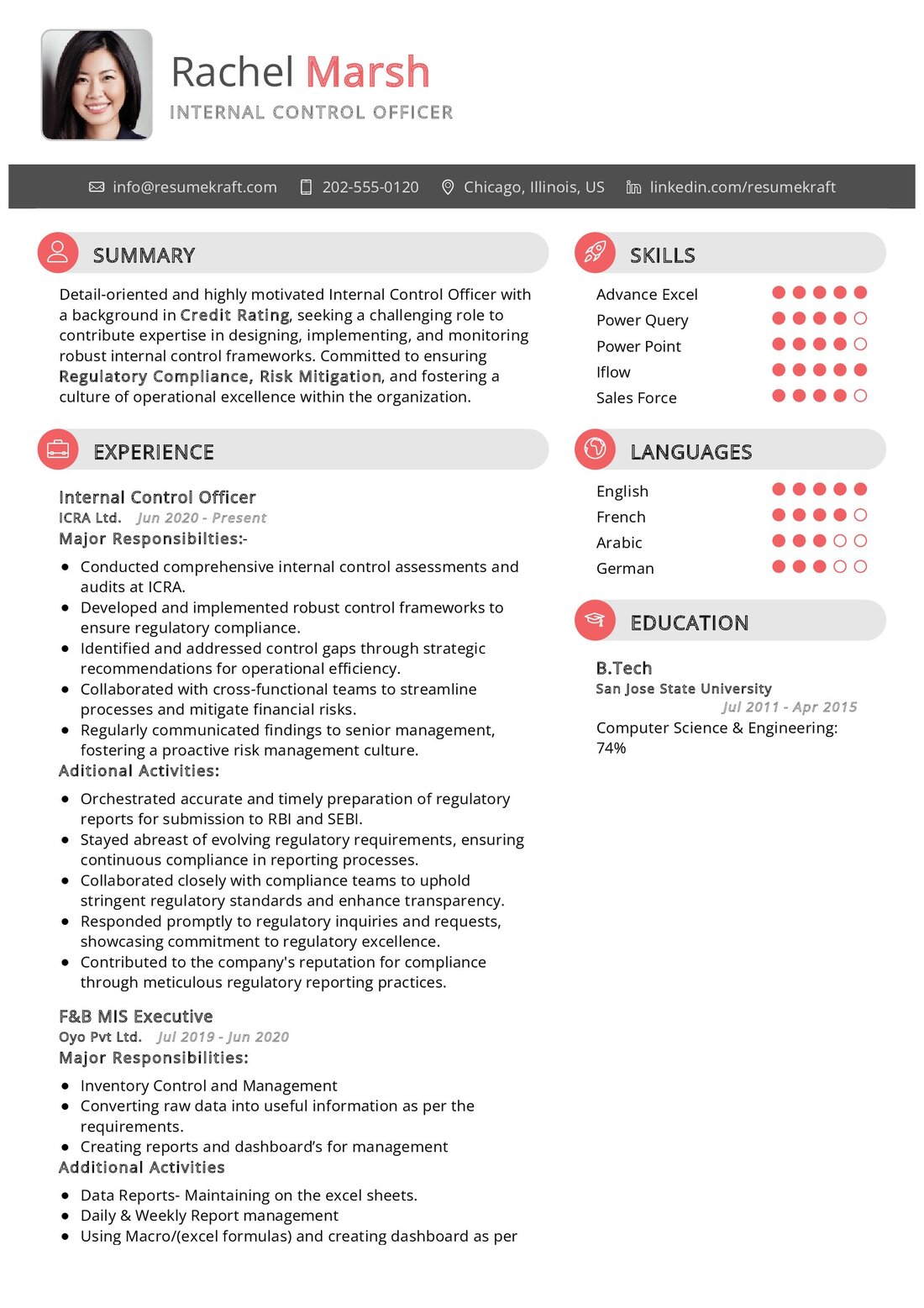Understanding the Vital Role of an Internal Control Officer
As the business world becomes increasingly complex, the role of an Internal Control Officer has gained prominence in organizations across various industries. This position is not only crucial for ensuring compliance but also for safeguarding the financial health and reputation of the company. In this comprehensive guide, we will explore the multifaceted role of an Internal Control Officer, the essential job requirements, responsibilities, and how to craft a compelling resume that showcases your expertise in this vital role.
Job Requirements for an Internal Control Officer
Stepping into the shoes of an Internal Control Officer requires meeting specific requirements that reflect your qualifications and expertise in risk management and compliance. Let’s delve deeper into the prerequisites that one needs to fulfill to excel in this role:
- A Bachelor’s or Master’s degree in Accounting, Finance, or a related field, demonstrating a strong foundation in financial principles.
- Profound knowledge of auditing standards and practices, including internal audit processes and risk assessment methodologies.
- Experience in internal auditing, with a track record of conducting comprehensive audits and identifying areas of improvement.
- Strong analytical skills and attention to detail, essential for identifying potential risks and weaknesses in internal controls.
- Excellent communication skills, both written and verbal, to effectively communicate audit findings and recommendations.
- Knowledge of relevant laws and regulations, such as the Sarbanes-Oxley Act (SOX) and industry-specific compliance requirements.
- Proficiency in using auditing software and data analysis tools to enhance the efficiency of audits.
- Ability to work under pressure and meet deadlines in a fast-paced corporate environment.
Securing additional certifications, such as the Certified Internal Auditor (CIA) or Certified Public Accountant (CPA), can significantly enhance your profile as an Internal Control Officer.
Key Responsibilities of an Internal Control Officer
The role of an Internal Control Officer is dynamic, encompassing a wide range of responsibilities aimed at safeguarding the company’s assets and ensuring compliance with internal policies and external regulations. Here are the core responsibilities that define this role:
- Conducting thorough internal audits to assess the effectiveness of the company’s internal controls and risk management processes.
- Evaluating financial statements, operational procedures, and business processes to identify areas of improvement and potential risks.
- Developing and implementing audit plans, including risk assessments, audit scope, and testing procedures.
- Collaborating with cross-functional teams to ensure audit findings are understood and necessary actions are taken to address identified issues.
- Providing recommendations for process improvements and control enhancements to mitigate risks and improve operational efficiency.
- Monitoring and reporting on the status of internal audit findings and the implementation of corrective actions.
- Staying updated on changes in regulations and industry best practices to ensure the company’s compliance efforts are current and effective.
- Assisting in the development and maintenance of internal control policies and procedures.
Each of these responsibilities plays a critical role in maintaining the integrity of the organization’s financial and operational processes.
Creating an Impressive Resume for an Internal Control Officer
Your resume is your passport to a rewarding career as an Internal Control Officer. It should not only reflect your qualifications but also highlight your skills and achievements in the field of internal auditing and risk management. Here are some tips to craft a standout resume:
- Highlight your auditing experience, showcasing specific audits you have conducted and the impact of your findings on the organization’s operations.
- Detail any process improvements or cost-saving initiatives you have recommended and implemented.
- Include metrics to quantify your achievements, such as the percentage of risk reduction or cost savings achieved through your audit recommendations.
- List relevant certifications prominently to demonstrate your commitment to professional development.
- Customize your resume for each job application, emphasizing the skills and qualifications that align with the specific job requirements.
Your resume should be a compelling narrative of your expertise and accomplishments as an Internal Control Officer.
Unique Key Takeaways for Your Internal Control Officer Resume
Now that we’ve explored the critical aspects of the Internal Control Officer role, let’s summarize some unique key takeaways to include in your resume:
- Emphasize your role in risk assessment and mitigation, showcasing your ability to protect the organization from potential financial and operational risks.
- Highlight your skills in data analysis and the use of auditing tools to enhance the efficiency and accuracy of internal audits.
- Showcase your communication skills, emphasizing your ability to effectively communicate audit findings and recommendations to stakeholders.
- Demonstrate your commitment to compliance by listing relevant certifications and your knowledge of regulatory requirements.
Your resume should reflect not only your qualifications but also your unique strengths as an Internal Control Officer.
Conclusion: Secure Your Future as an Internal Control Officer
As an Internal Control Officer, you play a pivotal role in safeguarding your organization’s financial health and ensuring compliance with regulations. Your expertise in auditing, risk assessment, and process improvement is a valuable asset that contributes to the company’s success.
Now that you have a comprehensive understanding of the role, requirements, and responsibilities of an Internal Control Officer, it’s time to take the next step in your career journey. Craft a compelling resume that showcases your skills and accomplishments, and start your search for the perfect opportunity.
Remember, your resume is your first impression, and it should reflect your dedication to excellence in internal auditing and risk management.
Finally, feel free to utilize resources like AI Resume Builder, Resume Design, Resume Samples, Resume Examples, Resume Skills, Resume Help, Resume Synonyms, and Job Responsibilities to create a standout application and prepare for the Internal Control Officer job interview.


